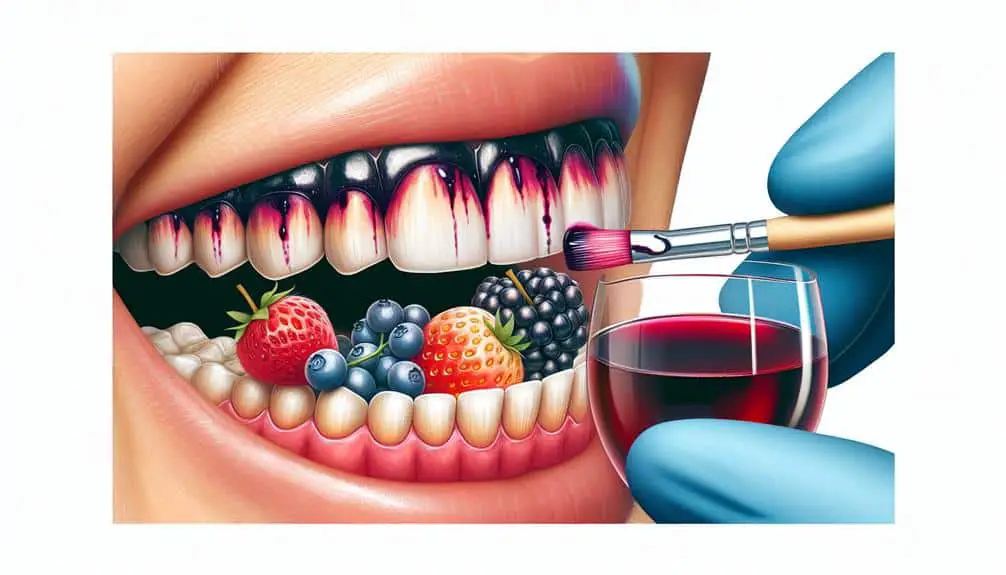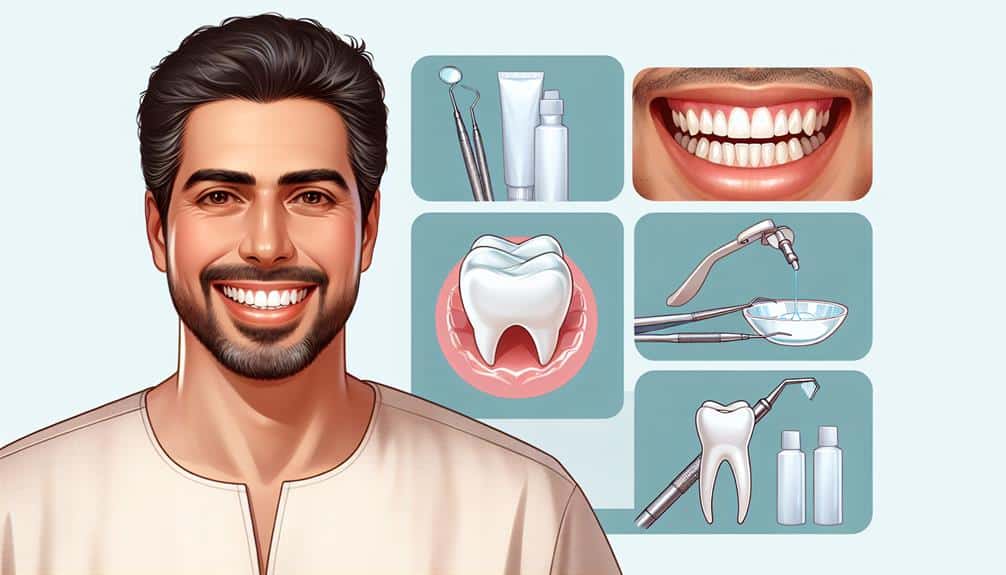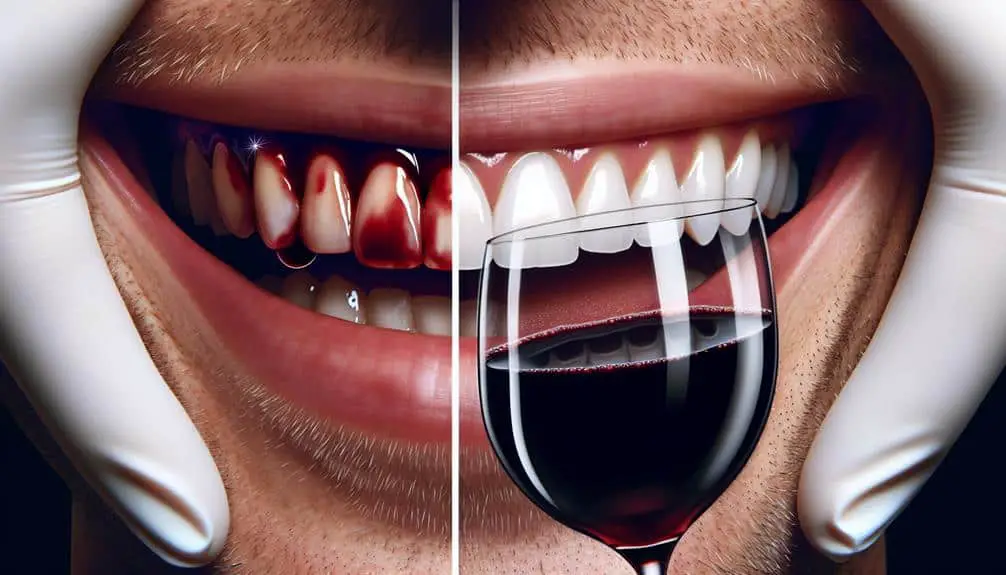Certain foods like coffee and red wine contain pigments and acids that stain teeth. Rinsing with water and brushing can help. Whitening strips with peroxide are effective for removing surface stains. Professional cleanings also help. Natural remedies like charcoal and baking soda can aid in whitening. Opt for teeth-friendly foods and maintain good oral hygiene. These strategies can combat teeth stains and keep your smile bright.
Key Points
- Foods like coffee and red wine contain pigments that adhere to enamel, causing stains.
- Acidity in these foods can erode enamel, making it more susceptible to staining.
- Rinse with water and brush after consuming to help prevent stains.
- Use whitening strips with peroxide or seek professional cleanings to remove stains.
- Opt for teeth-friendly foods, maintain good oral hygiene, and get regular dental check-ups for a brighter smile.
Foods That Cause Teeth Stains
Certain foods and beverages can lead to teeth stains due to their pigments and acidic nature. Among the most common culprits are coffee stains and red wine discoloration.
Coffee, a beloved morning beverage for many, contains intense pigments that can adhere to the enamel of your teeth, causing yellow or brown discoloration over time. The acidity in coffee can also erode the enamel, making it more susceptible to staining from other foods.
Red wine, while enjoyable for its flavor profile, contains chromogens and tannins that can deeply penetrate the enamel, leading to a darkening effect on the teeth. The acidity in red wine can further exacerbate the staining process by weakening the enamel.
To mitigate the effects of coffee stains and red wine discoloration, consider rinsing your mouth with water after consuming these beverages and brushing your teeth about 30 minutes later to remove any residual pigments. Additionally, regular dental cleanings can help remove surface stains and prevent deeper discoloration.
Common Culprits for Teeth Discoloration
To understand the reasons behind teeth discoloration, it's important to recognize the common culprits that contribute to staining. Some of the key offenders include coffee spills, red wine, berry juices, and curry sauces.
Coffee spills are notorious for staining teeth due to their dark pigments that easily adhere to the enamel. Red wine contains chromogens and tannins that can lead to discoloration over time, especially when consumed regularly. Berry juices, such as those from blueberries or blackberries, are rich in vibrant colors that can leave unsightly stains on teeth if not properly cleaned. Similarly, curry sauces, with their deep and intense hues, have the potential to cause teeth discoloration, particularly if consumed frequently.
Being mindful of these common culprits and taking appropriate measures can help in preventing or minimizing teeth discoloration. Stay tuned to learn more about effective ways to combat and remove these stains for a brighter, healthier smile.
Ways to Combat Teeth Stains
Understanding the various methods available to combat teeth stains is essential for maintaining a bright and healthy smile. One effective option is using whitening strips, which offer convenience and ease of use. These strips are coated with a whitening gel containing hydrogen peroxide or carbamide peroxide, aiding in the removal of surface stains and enhancing the overall whiteness of your teeth. The benefits of whitening strips include their affordability and the ability to use them at home without the need for professional assistance.
Another *important* method to combat teeth stains is through regular professional cleanings. These cleanings performed by dental hygienists are *extremely* important for removing stubborn plaque, tartar, and surface stains that can't be easily eliminated through regular brushing and flossing. Professional cleanings not only help in maintaining oral health but also contribute *greatly* to preventing teeth discoloration over time.
Natural Remedies for Whiter Teeth
For achieving a brighter smile through natural means, consider incorporating simple remedies that can help whiten your teeth effectively. Herbal remedies have been used for centuries to promote oral health and whiten teeth. Two popular options include using activated charcoal and baking soda. Activated charcoal is known for its ability to absorb toxins and stains, helping to whiten teeth naturally. Baking soda, on the other hand, has mild abrasive properties that can gently scrub away surface stains on teeth.
DIY treatments are another avenue to explore for whiter teeth. One common at-home remedy is oil pulling, where you swish coconut oil around in your mouth to help remove bacteria and stains. Another popular method is using hydrogen peroxide as a mouthwash, which can help whiten teeth over time. However, employing these DIY treatments cautiously and not excessively is crucial to avoid damaging your enamel.
Incorporating herbal remedies and DIY treatments into your oral care routine can be a cost-effective and natural way to achieve a whiter smile.
Lifestyle Changes for Brighter Smiles
Incorporating simple lifestyle changes can greatly contribute to achieving brighter smiles and maintaining oral health. When it comes to dietary habits, opting for teeth-friendly foods and beverages can make a significant difference in the color and overall health of your teeth. Foods high in sugar and acids can lead to tooth discoloration and decay, so choosing crunchy fruits and vegetables like apples and carrots that can help scrub away plaque is a vital choice.
Additionally, drinking plenty of water throughout the day helps rinse away food particles and reduce the impact of staining substances.
Maintaining good oral hygiene practices is equally essential for a brighter smile. Brushing your teeth at least twice a day with fluoride toothpaste, flossing daily, and using mouthwash can help prevent stains and keep your teeth looking their best. Regular dental check-ups and professional cleanings are also necessary to address any potential issues early on and maintain a bright, healthy smile.
Frequently Asked Questions
Can Genetics Play a Role in Teeth Staining Despite Avoiding Common Culprits?
Genetic factors can indeed play a role in teeth staining, even if you avoid common culprits. Lifestyle habits, like smoking or drinking coffee, can exacerbate this. Regular dental care and professional cleanings can help manage genetic predispositions.
Is There a Correlation Between Certain Medications and Teeth Discoloration?
When it comes to teeth discoloration, medications can play a significant role. Some medications, along with factors like diet, smoking, and beverages, can contribute to staining. Being mindful of these influences is crucial for maintaining a bright smile.
How Does Age Impact the Likelihood of Developing Teeth Stains?
As you age, the likelihood of developing teeth stains increases due to dietary habits and intrinsic changes in tooth structure. Prevention through regular dental cleanings and avoiding staining foods is key. Treatment options like professional whitening can help restore your smile.
Are There Specific Dental Procedures That Can Help Remove Deep-Seated Teeth Stains?
You may wonder if dental procedures can help with tough stains. Yes, professional whitening and enamel restoration can effectively remove deep-seated teeth stains. Dentists use advanced techniques to restore your pearly whites.
Can Certain Medical Conditions Contribute to Teeth Discoloration?
Certain medical conditions may contribute to teeth discoloration. Factors like dietary habits and overall health can play a role. Additionally, environmental factors and lifestyle choices can impact the color of your teeth. Regular dental check-ups can help address any concerns.



